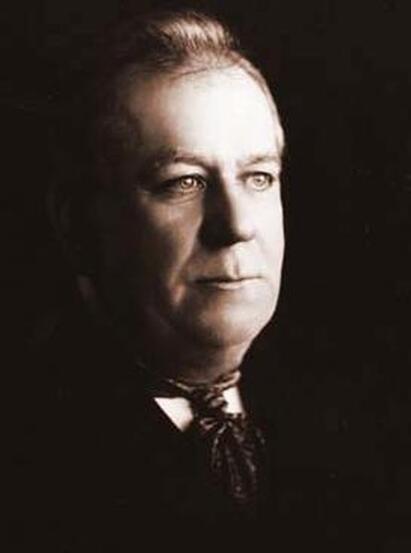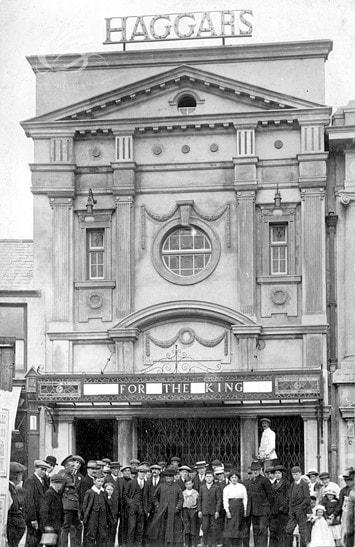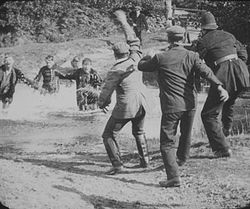Haggarfest
Silent Film Festival
Celebrating William Haggar, Our Greatest Showman
Saturday October 19th 2024
Our Greatest Showman
There were very few in the South Wales valleys at the turn of the twentieth century who would not have heard the name of William Haggar. The announcement that Haggar’s show would visit a town kept everyone in an excited state for weeks on end
He spent more the 60 years entertaining the public through extreme hardships as a travelling showman to the more prosperous times as a well-known cinema owner. He settled in Aberdare for the last part of his life where many local people remembered him as the owner of the Kosy Kinema in Market Street, Aberdare
But Haggar was far more than just a cinema owner. In the course of a wonderfully eventful career, he was a travelling showman, an actor and musician, the owner of his own touring company, one of the earliest film exhibitors with his travelling ‘Bioscope’ show, a pioneering film maker and finally having given up the travelling life settled in Aberdare as a cinema proprietor owning a number of ‘picture palaces’
There is no doubt however that it is as an innovative film maker that William Haggar will be remembered. No other early British screen director shared William Haggar’s range of experience in cinema, fairground, and the theatre. In film making his advanced use of editing and depth of staging can be seen in more than 30 films made between 1901 and 1908. Two of his surviving extant films, ‘A Desperate Poaching Affray’ (1903) and 'The Life of Charles Peace' (1905), are among the most important British Films of the 20th century’s first decade. In total Haggar made over 30 documented films, which were shown worldwide, although only 6 are known to exist today
From the 1890’s Haggar and his family toured almost exclusively across South Wales, frequently pitching his Winter camp in Aberdare, and staying for most of the Summer in Pembrokeshire. His large family formed his theatre company, later buying a Bioscope show to earn money at fairgrounds across South Wales. From 1902 he began making his own films, making him one of the earliest directors in Britain. His films were worldwide and influenced early American drama - "The Desperate Poaching Affray" indeed is believed to have deeply influenced early narrative drama in American film, and particularly in the chase genre
Following the death of his wife Sarah, in 1909 Haggar settled permanently in Aberdare. In 1910, he opened William Haggar's Coliseum, later renamed Haggar's Electric Palace, on a permanent pitch at Market Yard. The Electric Palace was then followed by additional cinemas in Llanelli, Pontardulais, Neath, Mountain Ash and Pembroke
In 1912 Haggar remarried, to Mary Davies, daughter of Jenkin Davies, the proprietor of the 'Bird in Hand Inn' in Aberdare. He and Mary had a house built in Abernant, which they called 'Kinema House', and was elected to the Merthyr Board of Guardians of the Poor in 1913 and became a councillor to Aberdare Urban District Council
Following a pioneering film career of over 25 years, Haggar passed away on 4 February 1925 at 'Maer-yr-haf' in Elm Grove, Aberdare, the home of his son Walter. He is buried at Aberdare cemetery
There were very few in the South Wales valleys at the turn of the twentieth century who would not have heard the name of William Haggar. The announcement that Haggar’s show would visit a town kept everyone in an excited state for weeks on end
He spent more the 60 years entertaining the public through extreme hardships as a travelling showman to the more prosperous times as a well-known cinema owner. He settled in Aberdare for the last part of his life where many local people remembered him as the owner of the Kosy Kinema in Market Street, Aberdare
But Haggar was far more than just a cinema owner. In the course of a wonderfully eventful career, he was a travelling showman, an actor and musician, the owner of his own touring company, one of the earliest film exhibitors with his travelling ‘Bioscope’ show, a pioneering film maker and finally having given up the travelling life settled in Aberdare as a cinema proprietor owning a number of ‘picture palaces’
There is no doubt however that it is as an innovative film maker that William Haggar will be remembered. No other early British screen director shared William Haggar’s range of experience in cinema, fairground, and the theatre. In film making his advanced use of editing and depth of staging can be seen in more than 30 films made between 1901 and 1908. Two of his surviving extant films, ‘A Desperate Poaching Affray’ (1903) and 'The Life of Charles Peace' (1905), are among the most important British Films of the 20th century’s first decade. In total Haggar made over 30 documented films, which were shown worldwide, although only 6 are known to exist today
From the 1890’s Haggar and his family toured almost exclusively across South Wales, frequently pitching his Winter camp in Aberdare, and staying for most of the Summer in Pembrokeshire. His large family formed his theatre company, later buying a Bioscope show to earn money at fairgrounds across South Wales. From 1902 he began making his own films, making him one of the earliest directors in Britain. His films were worldwide and influenced early American drama - "The Desperate Poaching Affray" indeed is believed to have deeply influenced early narrative drama in American film, and particularly in the chase genre
Following the death of his wife Sarah, in 1909 Haggar settled permanently in Aberdare. In 1910, he opened William Haggar's Coliseum, later renamed Haggar's Electric Palace, on a permanent pitch at Market Yard. The Electric Palace was then followed by additional cinemas in Llanelli, Pontardulais, Neath, Mountain Ash and Pembroke
In 1912 Haggar remarried, to Mary Davies, daughter of Jenkin Davies, the proprietor of the 'Bird in Hand Inn' in Aberdare. He and Mary had a house built in Abernant, which they called 'Kinema House', and was elected to the Merthyr Board of Guardians of the Poor in 1913 and became a councillor to Aberdare Urban District Council
Following a pioneering film career of over 25 years, Haggar passed away on 4 February 1925 at 'Maer-yr-haf' in Elm Grove, Aberdare, the home of his son Walter. He is buried at Aberdare cemetery
Haggar was a true pioneer, and his work a lasting inspiration. An annual celebration of Haggar and Aberdare's role in the development of the film and cinema industry is long overdue. Haggarfest will now be an annual celebration of film, to be held at St Elvan's each October, the site adjacent to the former "Rex" Cinema and the venue for a number of Haggar family weddings
The inaugural Haggarfest will take place on Saturday October 19th 2024, a timetable for which is outlined below
The inaugural Haggarfest will take place on Saturday October 19th 2024, a timetable for which is outlined below
Haggarfest
Saturday October 19th
Schedule
10:30
Welcome & Introduction
11:00
"William Haggar - Our Greatest Showman"
Opening Talk & Exhibition Celebration
St Elvan's Heritage Research Group
12:00
Haggar Walk
Aberdare Town Centre
OR
Optional Screenings
Mezzanine Gallery & Green Room
13:00
Lunch Break
14:00
"Fairground Film Maker"
Peter Yorke
15:00
Break
15:30
Closing Recital
Paul Shallcross, piano
Programme
A Message From The Sea (1905)
Revenge (1904)
The Maid of Cefn Ydfa (1908)
16:30
Break
19:00
The Silver Screen
Evening Concert
Paul Shallcross
Lewis Merthyr Band
Programme
20th Century Fox Fanfare | Death or Glory
The Bather's Revenge (1904) [Haggar]
The Desperate Poaching Affray (1903) [Haggar]
The Sheepstealer (1908) [Haggar]
Haunted House (1921) [Buster Keaton]
The Life & Times of Charles Peace (1905) [Haggar]
One Week (1920) [Buster Keaton]
Schedule
10:30
Welcome & Introduction
11:00
"William Haggar - Our Greatest Showman"
Opening Talk & Exhibition Celebration
St Elvan's Heritage Research Group
12:00
Haggar Walk
Aberdare Town Centre
OR
Optional Screenings
Mezzanine Gallery & Green Room
13:00
Lunch Break
14:00
"Fairground Film Maker"
Peter Yorke
15:00
Break
15:30
Closing Recital
Paul Shallcross, piano
Programme
A Message From The Sea (1905)
Revenge (1904)
The Maid of Cefn Ydfa (1908)
16:30
Break
19:00
The Silver Screen
Evening Concert
Paul Shallcross
Lewis Merthyr Band
Programme
20th Century Fox Fanfare | Death or Glory
The Bather's Revenge (1904) [Haggar]
The Desperate Poaching Affray (1903) [Haggar]
The Sheepstealer (1908) [Haggar]
Haunted House (1921) [Buster Keaton]
The Life & Times of Charles Peace (1905) [Haggar]
One Week (1920) [Buster Keaton]







